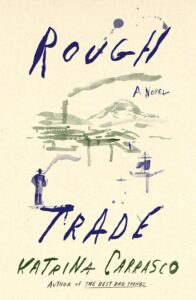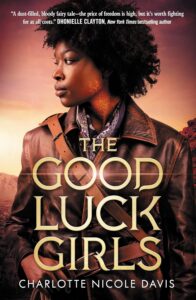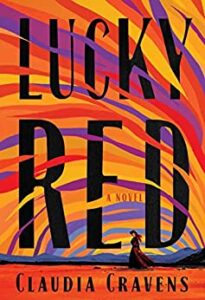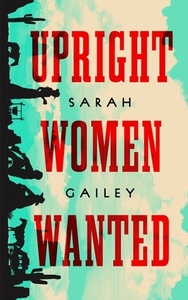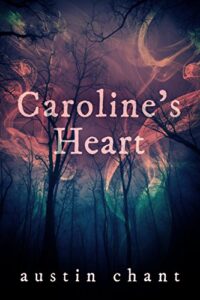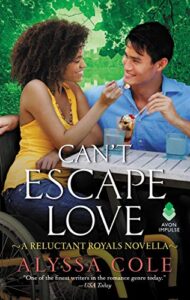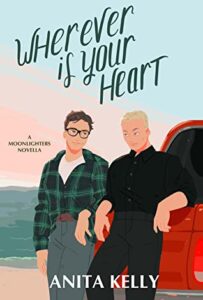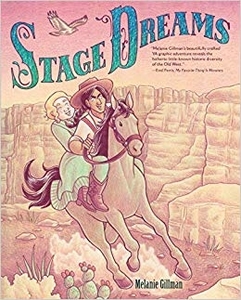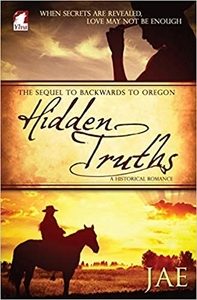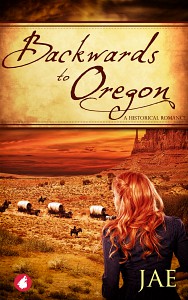Buy this from Bookshop.org to support local bookstores and the Lesbrary!
(Note: This book is a sequel but can be enjoyed without reading the previous one)
Fans of historical fiction with high-stakes hijinks and well-developed human characters with strong internal compasses can rejoice! Rough Trade by Katrina Carrasco opens on the early days of organized labor and careens headlong into a riveting world of gunfights, train heists, and scheming smuggler-duggery that doesn’t let up on its deeply immersive historicism for the next 300+ pages.
The first page also features this gem of a quote “Alma Rosales is sweating through every layer of the men’s clothes she calls home”.
The main POV character is said Alama Rosales, an unrepentant, fiercely loyal bisexual who has realized that a man’s persona suits her appetites and ambitions far better than skirts ever did. She’s a former member of the Pinkertons (Women’s Division) who long ago traded in that history for a chance to reinvent herself as hardened, hardscrabble stevedore and opium smuggler “Jack Camp”. That hard-earned equilibrium is disturbed when dead bodies begin to show up in unlikely places, attracting a figure from her past with secrets Alma would rather not face, and another from the ever-encroaching future she has to, sooner or later.
As the history and progress collide in the frontier harbor she’s come to call home, Alma is forced to confront exactly how far she’s willing to go to preserve everything she’s built on the unforgiving shore of Tacoma, 1888.
Rough Trade is at times a brilliantly twisty thriller, a tightly-examined glimpse into life on the early edge of American mythmaking, and a roustabout adventure that centers the people who kept the economy going both above and below the board and the table at the turn of the twentieth century. It is grounded in those realities, and the spaces socioeconomic marginalization made for all the aching beauty and equally fraught compromises that accompanied then-outlawed queer desires. In that way, it is also a heartfelt book and an unromantic one, about the freedom that comes from connecting to people who see you for yourself, in the risks of getting lost in a persona but also everything that can be gained when a fiction allows you to reveal who you want to be so bad you can taste it in your dreams.
There is something uncompromising about the way Carrasco’s characters exist. I appreciated how they feel lived-in, like real people saying and doing what they think will bring them closer to their desires—and whose plans must change shape when those desires do, too. Identities in Carrasco’s vision of the Wild West are adaptable, craftable, at times malleable. They serve as shields, comforts, and weapons, all with a keen understanding of how they can be used in service of their wielders’ all-pervading wants. It felt like a breath of fresh air to delve so deeply into the negotiations and nuances of this story, and I strongly recommend it to readers who enjoy rollicking, tightly-plotted adventures with strong characterization.
Who Will Enjoy This?
- People who want queer characters that rival the most ruffianish of cads historical fiction has ever conjured
- People who really, really miss the feeling of reading a Sherlock Holmes story for the first time and want to revisit it at book length.
- People who want Canada to be something other than a beacon of shining enlightenment FOR ONCE, lol.
- People who really, really enjoy morally ambiguous queers guided by their own inner compass (even if the needle is a little/lot crooked)
- People who want a period-accurate piece on gender nonconformity and queer life.
I can’t stress that last part enough. A book with period-accurate takes on gender-nonconformity and queer desire.
Who Might Think Twice?
- People who want more focus on sapphic steam and intimacy than whatever the dudes are doing. There’s a lot more guy on guy (or genderfluid-masc on guy) action in these pages than explicit sapphic content, fyi. Lots of sapphic yearning, but I fully understand anyone who is tired of reading about that and wants period-accurate five-chili-rating reads. You won’t find that here but for one scene. It is a delightful scene, though, and very bittersweet in context.
- People who want HEAs for all their queer characters. Or all the characters they become emotionally invested in.
- People who don’t like unresolved character arcs. This is actually the second book in a series, not that I knew that going in…
Content warnings: murder, violence, drug use

